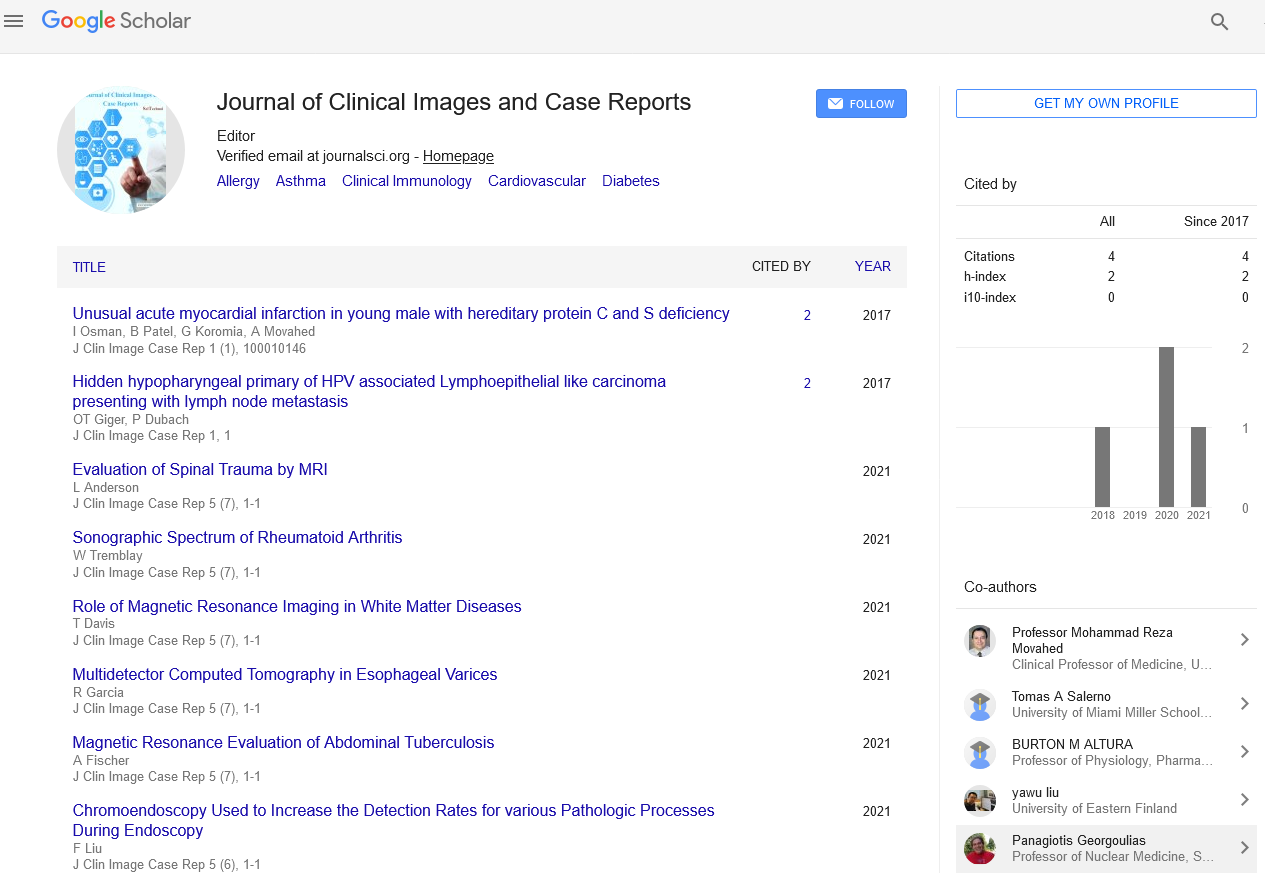Perspective, J Clin Image Case Rep Vol: 8 Issue: 5
The Role of Early Detection in Managing Glomerulonephritis
Fervenza Greco*
1Department of Medicine, Mayo Clinic College of Medicine and Science, Rochester, USA
*Corresponding Author: Fervenza Greco,
Department of Medicine, Mayo Clinic
College of Medicine and Science, Rochester, USA
E-mail: grecofervenza@gmail.com
Received date: 25 September, 2024, Manuscript No. CICR-24-153587;
Editor assigned date: 27 September, 2024, PreQC No. CICR-24-153587 (PQ);
Reviewed date: 11 October, 2024, QC No. CICR-24-153587;
Revised date: 18 October, 2024, Manuscript No. CICR-24-153587 (R);
Published date: 25 October, 2024, DOI: 10.4172/CICR.1000325
Citation: Greco F (2024) The Role of Early Detection in Managing Glomerulonephritis. J Clin Image Case Rep 8:5.
Description
Glomerulonephritis is a kidney disorder characterized by inflammation of the glomeruli, which are tiny structures in the kidneys that filter waste and excess fluid from the bloodstream. When the glomeruli are damaged, it can impair the kidney's ability to remove waste, potentially leading to kidney failure if not managed appropriately. Early detection and intervention are essential to controlling the condition and preventing irreversible kidney damage. Glomerulonephritis may not always present with noticeable symptoms, particularly in its early stages. As a result, many people remain unaware of the condition until it has progressed significantly.
This makes regular medical check-ups and tests vital for early detection. One of the most important screening tools is a urine test. Proteinuria, or the presence of protein in the urine, is often an early sign of kidney damage. Although it is not always noticeable to the patient, proteinuria can be easily detected during routine urinalysis. The presence of blood in the urine, or hematuria, is another common early sign of glomerulonephritis that may indicate inflammation in the kidneys.
In addition to urine tests, blood tests are used to assess kidney function. Elevated levels of creatinine and Blood Urea Nitrogen (BUN) in the blood are signs that the kidneys may not be filtering waste properly. These blood tests can help determine whether kidney function is declining and whether further investigation is needed. A kidney biopsy, though more invasive, is sometimes required to confirm the diagnosis and determine the specific cause of the inflammation. In many cases, glomerulonephritis is a result of an underlying condition, such as an autoimmune disorder, infection, or vasculitis and a biopsy can help identify the exact cause.
Once glomerulonephritis is diagnosed, the focus shifts to managing the condition and preventing further kidney damage. The treatment approach depends on the underlying cause of the disease. In cases where the inflammation is caused by an infection, such as poststreptococcal glomerulonephritis, antibiotics or antiviral treatments are typically used to eliminate the infection. If the condition is related to an autoimmune disorder, corticosteroids or other immunosuppressive medications may be prescribed to reduce inflammation and control the immune response.
In addition to medical treatments, lifestyle modifications are an essential aspect of managing glomerulonephritis. Blood pressure control is important, as high blood pressure can worsen kidney damage. Medications such as Angiotensin-Converting Enzyme (ACE) inhibitors or Angiotensin Ii Receptor Blockers (ARBs) may be prescribed to help lower blood pressure and protect the kidneys. A kidney-friendly diet, low in salt and protein, can also help reduce the burden on the kidneys and slow the progression of the disease.
Early detection of glomerulonephritis is difficult to preventing long-term kidney damage and preserving kidney function. Regular urine and blood tests, along with timely medical consultations, can help identify the condition before it progresses too far. Once diagnosed, the management of glomerulonephritis involves treating the underlying cause, controlling blood pressure, adopting a kidneyfriendly diet and in some cases, using medications or dialysis. With early intervention and appropriate care, many individuals with glomerulonephritis can maintain a good quality of life and avoid the need for more invasive treatments like dialysis or transplantation. Early detection, therefore, plays a pivotal role in both preventing complications and improving outcomes for patients with this potentially serious condition.
 Spanish
Spanish  Chinese
Chinese  Russian
Russian  German
German  French
French  Japanese
Japanese  Portuguese
Portuguese  Hindi
Hindi 